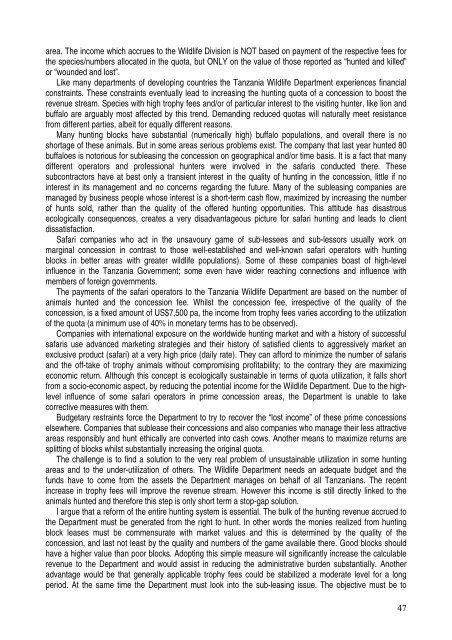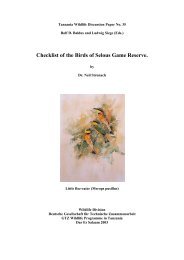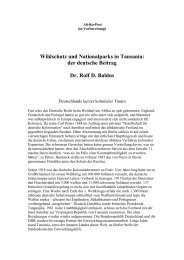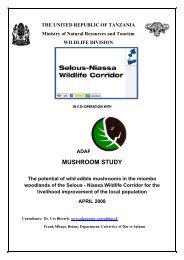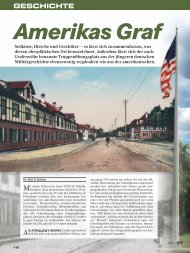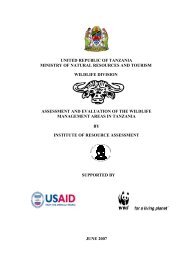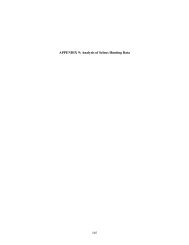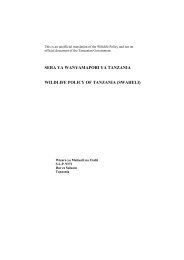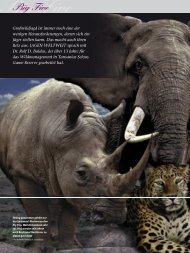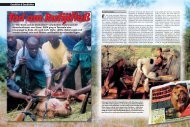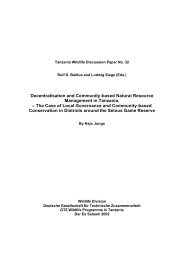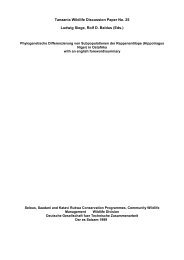African Indaba Articles - wildlife-baldus.com
African Indaba Articles - wildlife-baldus.com
African Indaba Articles - wildlife-baldus.com
Create successful ePaper yourself
Turn your PDF publications into a flip-book with our unique Google optimized e-Paper software.
area. The in<strong>com</strong>e which accrues to the Wildlife Division is NOT based on payment of the respective fees forthe species/numbers allocated in the quota, but ONLY on the value of those reported as “hunted and killed”or “wounded and lost”.Like many departments of developing countries the Tanzania Wildlife Department experiences financialconstraints. These constraints eventually lead to increasing the hunting quota of a concession to boost therevenue stream. Species with high trophy fees and/or of particular interest to the visiting hunter, like lion andbuffalo are arguably most affected by this trend. Demanding reduced quotas will naturally meet resistancefrom different parties, albeit for equally different reasons.Many hunting blocks have substantial (numerically high) buffalo populations, and overall there is noshortage of these animals. But in some areas serious problems exist. The <strong>com</strong>pany that last year hunted 80buffaloes is notorious for subleasing the concession on geographical and/or time basis. It is a fact that manydifferent operators and professional hunters were involved in the safaris conducted there. Thesesubcontractors have at best only a transient interest in the quality of hunting in the concession, little if nointerest in its management and no concerns regarding the future. Many of the subleasing <strong>com</strong>panies aremanaged by business people whose interest is a short-term cash flow, maximized by increasing the numberof hunts sold, rather than the quality of the offered hunting opportunities. This attitude has disastrousecologically consequences, creates a very disadvantageous picture for safari hunting and leads to clientdissatisfaction.Safari <strong>com</strong>panies who act in the unsavoury game of sub-lessees and sub-lessors usually work onmarginal concession in contrast to those well-established and well-known safari operators with huntingblocks in better areas with greater <strong>wildlife</strong> populations). Some of these <strong>com</strong>panies boast of high-levelinfluence in the Tanzania Government; some even have wider reaching connections and influence withmembers of foreign governments.The payments of the safari operators to the Tanzania Wildlife Department are based on the number ofanimals hunted and the concession fee. Whilst the concession fee, irrespective of the quality of theconcession, is a fixed amount of US$7,500 pa, the in<strong>com</strong>e from trophy fees varies according to the utilizationof the quota (a minimum use of 40% in monetary terms has to be observed).Companies with international exposure on the worldwide hunting market and with a history of successfulsafaris use advanced marketing strategies and their history of satisfied clients to aggressively market anexclusive product (safari) at a very high price (daily rate). They can afford to minimize the number of safarisand the off-take of trophy animals without <strong>com</strong>promising profitability; to the contrary they are maximizingeconomic return. Although this concept is ecologically sustainable in terms of quota utilization, it falls shortfrom a socio-economic aspect, by reducing the potential in<strong>com</strong>e for the Wildlife Department. Due to the highlevelinfluence of some safari operators in prime concession areas, the Department is unable to takecorrective measures with them.Budgetary restraints force the Department to try to recover the “lost in<strong>com</strong>e” of these prime concessionselsewhere. Companies that sublease their concessions and also <strong>com</strong>panies who manage their less attractiveareas responsibly and hunt ethically are converted into cash cows. Another means to maximize returns aresplitting of blocks whilst substantially increasing the original quota.The challenge is to find a solution to the very real problem of unsustainable utilization in some huntingareas and to the under-utilization of others. The Wildlife Department needs an adequate budget and thefunds have to <strong>com</strong>e from the assets the Department manages on behalf of all Tanzanians. The recentincrease in trophy fees will improve the revenue stream. However this in<strong>com</strong>e is still directly linked to theanimals hunted and therefore this step is only short term a stop-gap solution.I argue that a reform of the entire hunting system is essential. The bulk of the hunting revenue accrued tothe Department must be generated from the right to hunt. In other words the monies realized from huntingblock leases must be <strong>com</strong>mensurate with market values and this is determined by the quality of theconcession, and last not least by the quality and numbers of the game available there. Good blocks shouldhave a higher value than poor blocks. Adopting this simple measure will significantly increase the calculablerevenue to the Department and would assist in reducing the administrative burden substantially. Anotheradvantage would be that generally applicable trophy fees could be stabilized a moderate level for a longperiod. At the same time the Department must look into the sub-leasing issue. The objective must be to47


